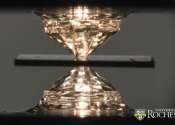The ultimate fate of a star shredded by a black hole
In 2019, astronomers observed the nearest example to date of a star that was shredded, or "spaghettified," after approaching too close to a massive black hole.

In 2019, astronomers observed the nearest example to date of a star that was shredded, or "spaghettified," after approaching too close to a massive black hole.
Astronomy
Jul 11, 2022
0
2158

In a historic achievement, University of Rochester researchers have created a superconducting material at both a temperature and pressure low enough for practical applications.
Condensed Matter
Mar 8, 2023
4
8072

Atoms are composed of electrons moving around a central nucleus to which they are bound. The electrons can also be torn away via the powerful electric field of a laser, overcoming the confining force of their nucleus. A half-century ...
General Physics
Apr 16, 2018
2
4374

Most modern electronic devices rely on tiny, finely-tuned electrical currents to process and store information. These currents dictate how fast our computers run, how regularly our pacemakers tick and how securely our money ...
General Physics
Feb 3, 2020
1
2683

In July, physicists were ecstatic in announcing preliminary results pointing to the discovery of the long-sought Higgs boson particle. The Higgs boson is a tiny subatomic particle that apparently weighs about 130 times as ...
General Physics
Sep 21, 2012
124
0

Electronic components have become faster and faster over the years, thus making powerful computers and other technologies possible. Researchers at ETH Zurich have now investigated how fast electrons can ultimately be controlled ...
General Physics
Aug 26, 2016
1
2102

Engineers at the University of California, San Diego developed a new technology that uses an oscillating electric field to easily and quickly isolate drug-delivery nanoparticles from blood. The technology could serve as a ...
Bio & Medicine
Nov 23, 2015
0
5055

In quantum physics, a vacuum is not empty, but rather steeped in tiny fluctuations of the electromagnetic field. Until recently it was impossible to study those vacuum fluctuations directly. Researchers at ETH Zurich have ...
Quantum Physics
Apr 11, 2019
6
2469

The chances of being struck by lightning are less than one in a million, but those odds shortened considerably this month when more than 4.2 million lightning strikes were recorded in every Australian state and territory ...
General Physics
Nov 24, 2022
3
466

(Phys.org)—A team of researchers working at the University of Konstanz, in Germany is claiming to have directly sampled electric-field vacuum fluctuations, which would be the first ever made. In their paper published in ...